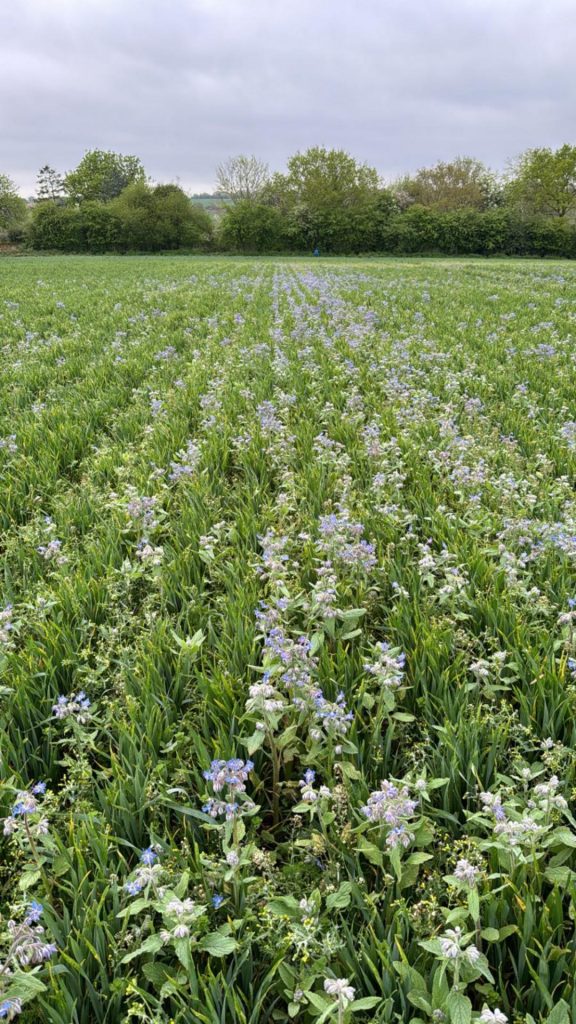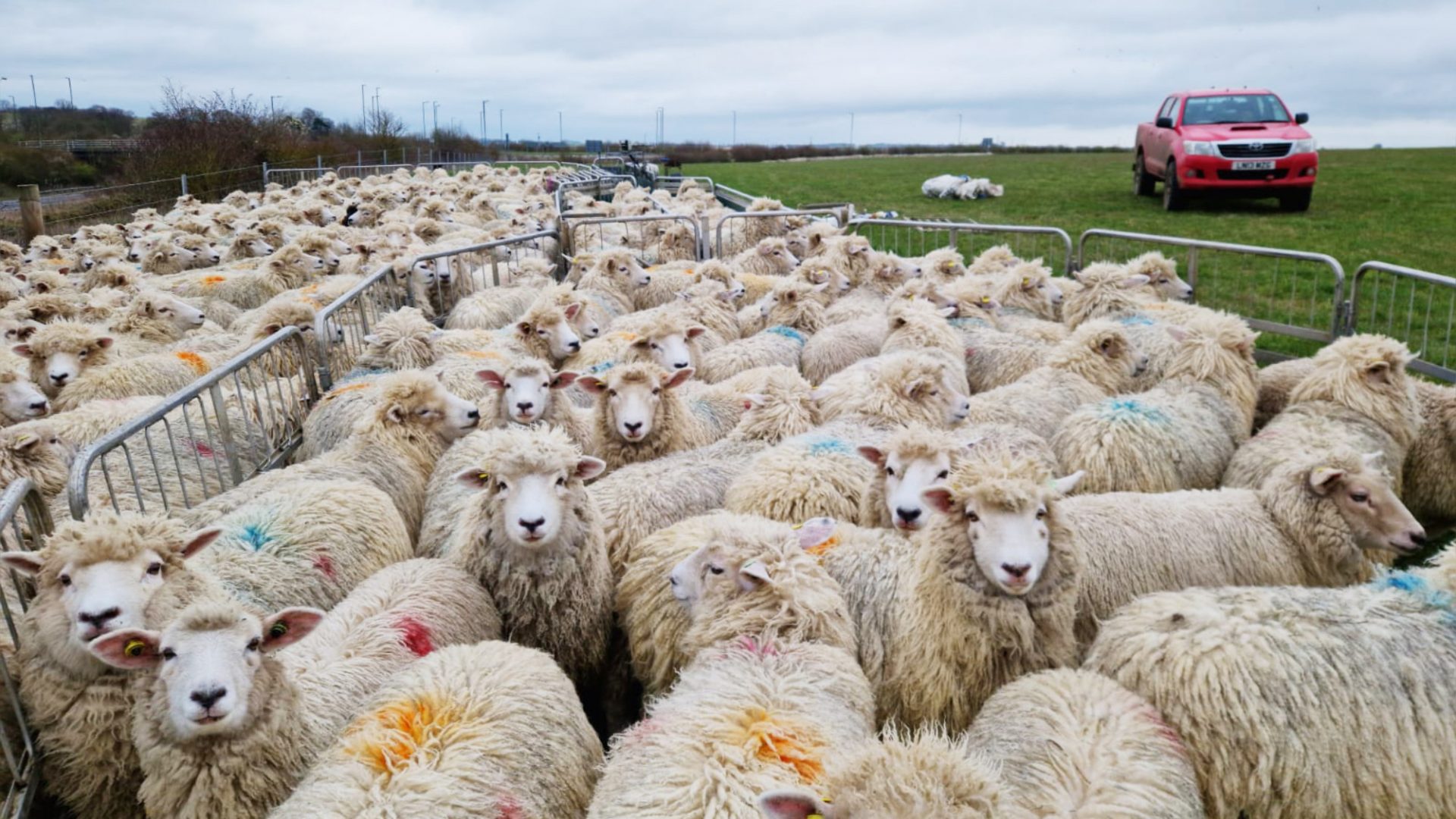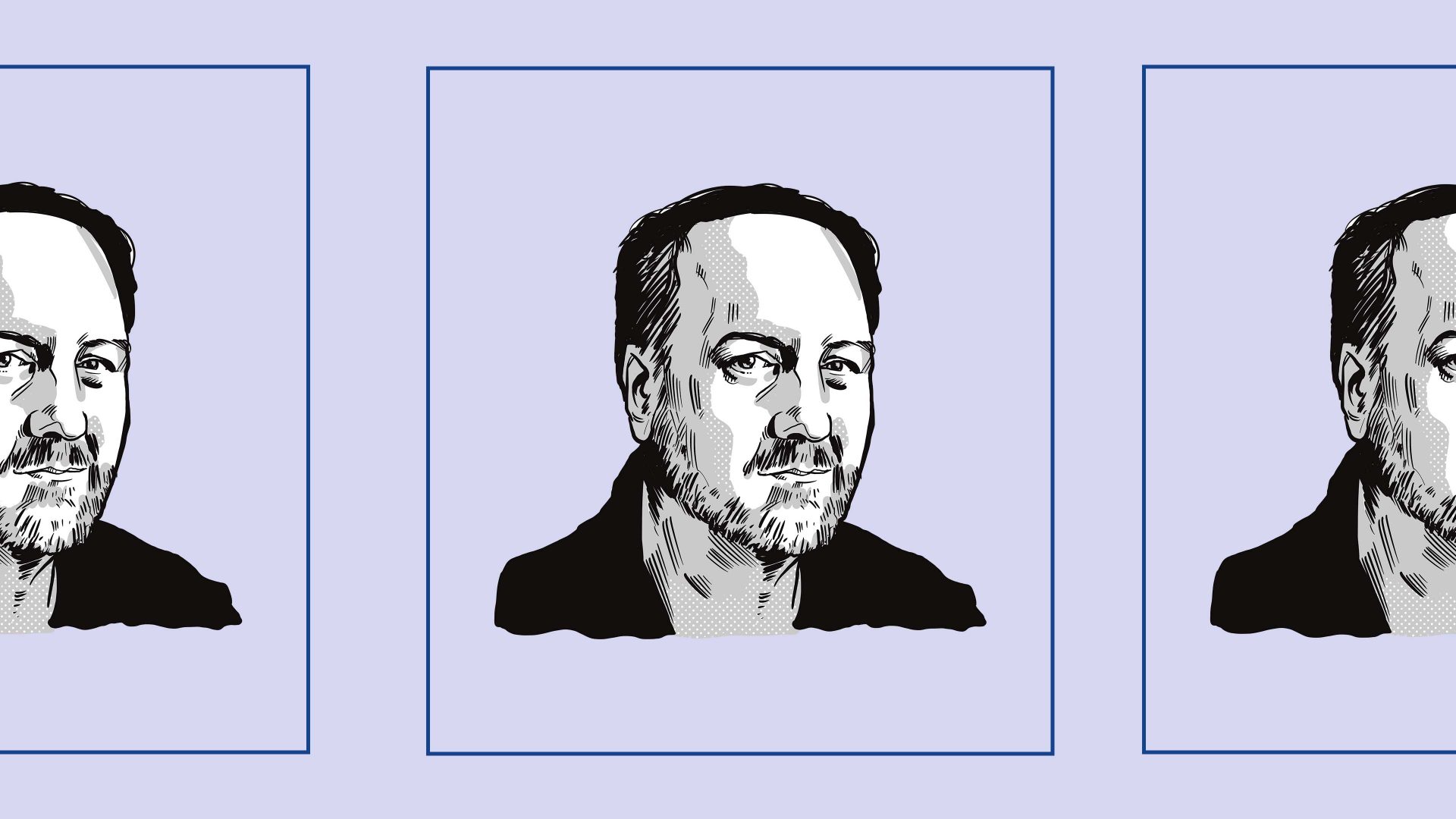Rob Hodgkins and Jo Franklin work at the cutting edge of modern farming.
Their 300-strong flock of dairy sheep are farmed “ethically”, meaning the ewes are not immediately separated from their mothers. Their larger flock of 1,600 sheep raised for meat are being genetically engineered using DNA testing to get the best traits they need each year for the best-quality product. The sheep are even tested to see how much methane and carbon dioxide they give off, so they can be bred to be as climate-friendly as possible.
The couple – who spent the money they had saved to get married to put down a deposit on a combine harvester instead (“but it’s a really nice combine,” says Rob) – farm 2,000 acres of crops, too. Again, it is scientific stuff: the seed drill they use is more terrifying than any contraption on Clarkson’s farm (and needs a tractor with tank-like tracks to tow it), but deposits fertiliser precisely by the seeds, reducing chemical use on the fields.
Crops are strategically picked and planted. The couple plant borage in addition to traditional crops, which is sold by alternative medicine shops as an oil. They use a camera, satellite and phone tower precision-guided system (accurate to 1.5cm) to help them weed, reducing pesticide use.
Everything is considered and hi-tech, while trying to be eco-friendly – nothing is done on autopilot. Rob has a background in engineering, Jo as an agronomist (and she is also studying for an MBA), and they met through a farming scholarship. The couple have built their business over the last decade, and it’s a successful one.
On August 31, they will lose a third of their land, and there’s nothing they can do – because Rob and Jo own none of the land they farm. They are “tenant” farmers, leasing their land in almost exactly the same manner as most millennials rent their flats or house shares.
Around half the farms and a third of the farmland in the UK are managed by tenants – but these tenant farmers are finding themselves under threat of abrupt eviction.
While this has always been a risk, it’s one that’s been exacerbated by Brexit, and the system the UK government has set up to replace the EU’s farming subsidies. It was intended as a way to help the environment, make farming sustainable and help tenants.
Instead, the system the Conservatives introduced – and Labour has said it intends to keep – has been accused of forcing working farmers off their land, hurting food production, and even for paying aristocrats taxpayer money to free up land for hunting and shooting.
“The tenant sector is as old as farming itself,” says Farmers Weekly editor Andrew Meredith. “Since the enclosures, there have been landowners and tenants.”
At the turn of the 20th century, almost 90% of UK farmland was farmed by tenants, which was the longstanding UK model. But as farming industrialised through the century, the large farms bought up their neighbours and became huge farms, which in turn made it harder and harder to survive as a smaller farm.
This consolidation of land was accelerated by government policies that were supposedly intended to help small farmers, particularly exempting farmland from inheritance tax – meaning that the ultra-right now often buy up large swathes of agricultural land when they are looking towards their estate planning.
Brexiteer James Dyson, for example, is now one of the UK’s largest farmers, with more than 36,000 acres of land (though farmers grudgingly credit him with taking a genuine interest in the sector and managing his land well).
Between aristocrats who have held their farmland for generations and billionaires incentivised to buy up huge parcels of land whether or not they intend to actively farm it themselves, people looking to get into farming – like Rob and Jo – have little option but to fight it out for tenancies.
Typical farming tenancies once lasted for generations: if you had a lease on land, your descendant would have an automatic right to inherit your tenancy, should they so wish. But today, farmers have little more security than the average housing tenant: the average lease on land is just three years.
That creates a bad incentive for countryside management. Modern farming needs to produce high yields to be competitive, especially given the supermarkets’ ferocious eye for cutting costs – but there is also an understanding that the soil has to be protected and we need to use less fertiliser (which leeches into the water) and fewer pesticides (which damage bees and other insects).

Land management is a long-term game, though, and tenancies are only three years. When a tenant farmer signs a lease, they have no reason to think their landlord won’t replace them when the time’s up.
What’s worse, if they actually invest time and money into improving the soil, an unscrupulous landlord might use that chance to lease out the land at a higher price to someone else.
That was, in effect, what tenant farmers would do in the 1990s and 2000s, when fuel, fertiliser and chemicals were cheap and three-year tenancies had already become the norm.
“Farmers would basically ravage their ground because they’re probably going to be kicked off it in a few years, or else the owner’s going to come back and want more money,” says Hodgkins. “You had two wheat crops and then a rape crop, and you just smashed it. And that’s how we’ve ended up in the world of problems we have now.”
Traditionally, fields need to have a “break” crop about one year in every three – something like pulses, beans, or clover, that helps to regenerate the soil but doesn’t generate much revenue for the farm. When someone is managing a field for the long term, this delivers better returns, but if you only have the field for three years, it risks being someone else’s problem later on.
Rob and Jo have tried to be conscientious tenants. Among their many bits of hi-tech equipment is one that sows clover in the gaps between cereal crops, once the plants have established, giving fields a boost even in years they aren’t left fallow.
The theory of the government’s Sustainable Farming Initiative was that it would help tenant farmers and the countryside. By offering cash to keep fields fallow, for example, it would make it financially viable for a tenant to do the right thing by the land. The reality is working out differently, across the country.
Rob and Jo had expected that their lease from their biggest landlord (they have more than a dozen in total) was going to be renewed, Jo tells me, fighting back tears in the portable building she uses as an office.
They had several years left to run on the tenancy, but the deal had a break clause. They had heard nothing from the landlord so were proceeding with their investment plans – and about to sign a £500,000 deal for a new combine – when on the very last day the landlord could activate the break clause, he did.
Both Rob and Jo note that farming is a business, and their landlord had every right to exert his contractual rights, but both clearly find the prospect of losing a third of their farm at a stroke a bitter pill to swallow. In August, they should be focused on the harvest. Instead, they are trying to work out how to make sure the rest of their business is still viable.
Neither knows for sure the reasons their own landlord decided to make the change, but both stress that the nature of the post-Brexit subsidy system has given landowners incentives to oust their tenants – and they have heard stories from other farmers in their situation.
As he tows a bowser full of diesel out to the combine harvester – farmers are never idle in summer, so our interview is having to fit in around work – Rob sets out the maths, having me work out some figures on a calculator as he does, using one particular subsidy (the scheme has many) as an example.
This scheme requires that no grazing is done in the field, no haymaking, nothing other than one cut per year. “I looked at it this morning to make sure my figures were accurate, and it is £593 per hectare that they’ll pay you for it,” he says. “I’ll get you exactly what we pay for our arable land. It’s £150 an acre rent, so times that by 2.47 to get hectares… that’s £370.50.”
In other words, a landowner can get just under £600 from the government to do nothing with his land other than pay someone once a year to cut down what’s grown on it – or he can get a little under £400 from a tenant farmer to work that land. What’s he going to do?
There are various limits on the scheme, including that it can only cover 25% of a farm’s land – but that means nothing to tenants. A landowner might own 10,000 acres, but lease it out in parcels of 400 or 500 acres at a time. The landlord might only put 2,500 acres into the government’s scheme, but that could represent four or five tenants losing the whole parcel of land they were leasing.
Given Labour’s history opposing hunting, Rob finds it ironic that some landowners could take advantage of the scheme the Tories had set up. The little cottage that used to be for farmworkers can now be an Airbnb for tourists. You can lease farm buildings to business.
“And if you shoot, then you’ve got hundreds of acres of wild shooting that you can now go on with impunity,” he says. “You can now buy a whole load of invasive species like French pheasants and partridges, you can release them on to this ground that the public is paying for but the public has no access to – and go and have a brilliant time, 15 days a year, you can rent it out to your mates for a day out, too.”
The new Labour government has inherited the subsidy system the Conservatives designed, but so far have signalled they do not intend to give it a major overhaul. If they stick to this path, there may be bigger problems than a Labour government paying aristocrats public money for their hunting land – it could make it all but impossible for smaller farms to survive, or for new farmers to get into the sector.
“We’ve had the red wall, we’ve had the blue wall, but Labour’s taken a load of semi-rural constituencies with farmland that they’re going to have to defend next time – a green wall, if you will,” says Farmers Weekly’s Andrew Meredith. “The government have a decision to make, or they are skirting around a decision about whether they want to protect the number of farmers or not.
“That’s very different to supporting food production, because you could continue to corporatise food production and have ever larger companies responsible for that, but I think the public at large would probably in the round be uncomfortable with that.”
Despite their setback, Rob and Jo are determined not to be among those forced out. If anything, it has shown the importance of getting into the position where they can eventually buy their own farmland – but in the meantime, Jo’s looking for new sources of revenue, including perhaps turning the sheep’s milk they farm into cheese themselves. There is always more to do.
“There are so many uninterested farmers farming because it was easier than going to get a proper job,” she says. “They don’t really have a passion for it. If they had to do it the way we’ve had to do it, they wouldn’t have done it. We have so many local farmers say, ‘oh, why do you bother?’. We bother because we have to.”




